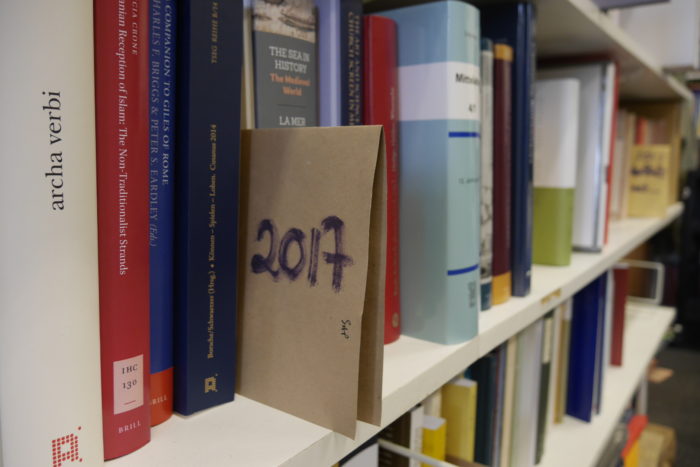Of the making of the books there is no end: the work of the IMB
The International Medieval Bibliography (IMB) aims to include publications from all disciplines and languages, focusing on those which represent the newest research and which are not separately catalogued by libraries. This includes articles in periodicals and essays in conference proceedings, Festschriften, and exhibition catalogues. Currently articles in 30 named languages are indexed, including Icelandic, Hebrew, and Japanese.
The articles indexed in the IMB derive from publishers’ review copies, the holdings of the Brotherton Library, and submissions from a team of about 80 contributors from around the world. Once the books are in the IMB office (or on the electronic bookshelves), the relevant articles are read and indexed by the editorial staff based at the University of Leeds; contributors do this for those articles not available to the editorial team. All staff members and contributors are medievalists, and the indexing is done from the full text of the article rather than abstracts.

Books ready to be processed in the IMB office.
Full bibliographical details of publications covered in the IMB are highlighted in each entry. In addition, each article is given a ‘three-dimensional’ classification covering general subject (the academic discipline which best relates to its content), geographical area, and century/centuries. Each article is also given 3-8 keywords, which allow enhanced search possibilities in addition to unstructured, free searches. There are over 120,000 index terms, from the crusades to dendrochronology, from queens to tadpoles, and from abbots to pomegranates. You can find out some of the more interesting article titles below.
Two giraffes emended
[J.R. Morgan, ‘Two giraffes emended’, Classical Quarterly, n.s. 38 (1988), 267-269]
Anglo-Saxon morning sickness
[Karma Lochrie, ‘Anglo-Saxon morning sickness’, Neophilologus, 70 (1986), 316-318]
Byzantine porridge
[Anthony M. Bryer, ‘Byzantine porridge’, in Studies in Medieval History Presented to R.H.C. Davis, ed. by Henry Mayr-Harting and R.I. Moore (London: Hambledon, 1985), pp. 1-6]
Fish of the fields: aubergines in the Ottoman period
[Priscilla Mary Is¸in, ‘Fish of the fields: aubergines in the Ottoman period’, Food and History, 11 (2013), 19-34]
Hot, fat sausages!
[Birthe Weber, ‘Heita, feita pylsa!’, Viking: Tidsskrift for norrøn arkeologi, 44 for 1980 (1981), 91-111]
